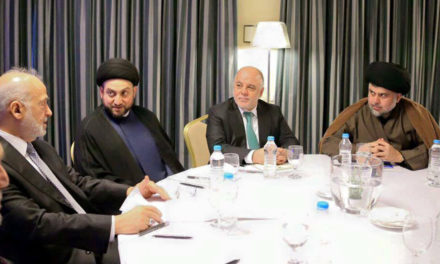(Paul Manafort associate W. Samuel Patten pleads guilty to charges of failing to register as foreign agent in a federal courthouse in Washington Aug. 31, 2018. Art Lein)
Unraveling the murky connections between political lobbying and the business dealings of American former officials in Iraq is a daunting task that is replete with layers of conflicts of interest. In 2016, I wrote about a coordinated campaign to establish an autonomous Sunni region in Iraq that sought to effectively break up the country. The campaign featured a nexus of Sunni politicians, unregistered American lobbyists and a renowned DC think tank. A year later, the Kurdistan Region held a referendum for independence, supported by a group of American ex-officials with business interests including Donald Trump’s former campaign manager Paul Manafort.
Last week, Sam Patten – a DC-based consultant and lobbyist – pleaded guilty to illegally acting as a foreign agent to a pro-Russian Ukrainian opposition group after the special counsel led by Robert Mueller allegedly referred his case to government prosecutors. The scandal revealed that Patten was an associate of Manafort, who was also found guilty on identical charges.
When the Kurdistan Regional Government hired Manafort last year, his connection to Patten was not publicly evident. These latest developments raise some interesting questions about the extent of collusion between Sunni and Kurdish separatist campaigns in Iraq.
Patten is an established name within DC lobbying circles who has represented politicians from Ukraine, Georgia and Nigeria. His most notable engagement in Iraq was in 2014, when he worked with former Iraqi deputy prime minister, Saleh Al-Mutlaq. Department of Justice records show that he received a $20,000 monthly retainer in exchange for consulting services during Mutlaq’s parliamentary election campaign.
In 2016, Patten emerged as the executive director of a DC-based pressure group known as the Committee to Destroy ISIS. Its stated goal was to empower local Sunni Iraqis to reclaim their territories from ISIS, but despite the fact that the committee was clearly representing and receiving backing from foreign individuals, Patten failed to register his work under the Foreign Agents Registration Act (FARA). The committee’s real goals became evident when a white paper was released by the DC think tank, Hudson Institute, entitled “West Iraq: the search for leaders and leverage”. The report authored by Michael Pregent describes how an Iraq partitioned into three states would allow a Sunni statelet to emerge that incorporates the predominantly Sunni provinces, while calling on the United States to support the endeavor. The report noted that the Committee to Destroy ISIS “helped defray expenses incurred during the preparation of this study”.
At the time, there were indications that the push for Sunni independence might be linked to a similar Kurdish effort. The Hudson paper made references to Kurdish independence, and Pregent is known to have close ties with Masoud Barzani’s Kurdistan Democratic Party. Furthermore, the Committee to Destroy ISIS openly supported Kurdish independence in a 2016 press release. The criminal prosecution of Patten confirms what was already suspected: that American lobbyists not only coordinated a two-pronged campaign to partition Iraq, but they willfully avoided disclosing their activities, thereby committing a federal crime.
A couple of questions remain unanswered: First, how many more DC consultants out there are acting in a criminally negligent way by failing to declare their work as foreign agents; and second, do they have associated business interests with the foreign individuals that they are representing?
Given the Russian ties to Manafort and Patten, it remains to be seen whether there is a Russian connection to the campaign to break up Iraq. One of the most peculiar developments that emerged just days prior to the Kurdish referendum was the decision by Russian oil giant Rosneft to invest over $1 billion in a gas pipeline in the Kurdistan Region. Whether Manafort played a role in the deal remains conjecture, but further investigation is important.
Finally, outstanding questions remain about the political ambitions of Sunni advocates for autonomy. Khamees Al-Khanjar, one of the leading advocates and financiers during the 2014-17 period is now a key player in the government formation negotiations, and while his current rhetoric has been tempered, his long-term ambitions are still unclear. He still enjoys close relations with Barzani, who offered him and his associates refuge in Erbil for many years. Unraveling the complex relationships between wealthy Sunni and Kurdish politicians, American lobbyists and their business interests is particularly timely given the developments in the United States and Iraq.

Ali Hadi Al-Musawi
Ali Hadi Al-Musawi is an Iraqi analyst and contributing writer at 1001 Iraqi Thoughts.










